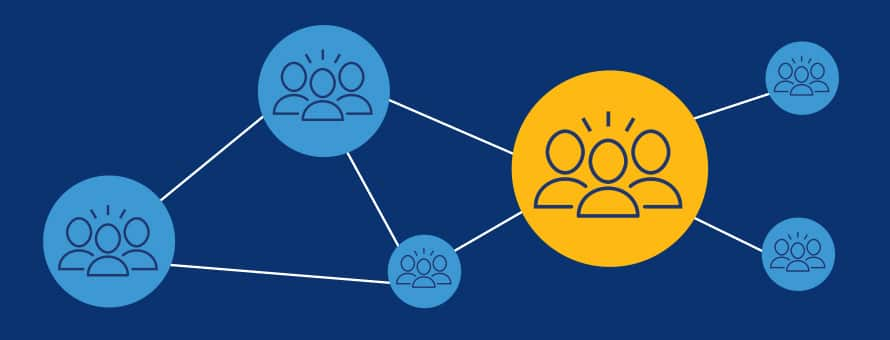What is Social Capital and Why is It So Important?

The original article, which was published in November 2019, was updated by Dr. Rick Mask in collaboration with Gina Neugebauer.
Social capital is not a new term. In fact, it has been examined by many scholars for nearly 100 years. The importance of social capital is not unknown to us, but for some reason, we seem to assign it a low value in modern society. We brush it off in exchange for convenience and “efficiency.”
So, why do we have so much trouble utilizing it? First, it's important to understand what it means.
What is Social Capital in Simple Terms?
Simply put, social capital is the value derived from positive connections between people.
In industry, this is described as a set of various relationships, reputations and assets existing within an organization or with its partners and customers that enable business processes to function as efficiently and effectively as possible.
We can break social capital down into three types:
- Relational Capital: the relationships we have with others in our world
- Cognitive Capital: the knowledge we have to share with the world around us
- Structural Capital: our individual brand and our processes
What Are Examples of Social Capital?
Social capital can be found in the potential outcomes of our ability, knowledge and actions. It shows up in a neighbor helping you shovel snow, getting a job through a friend’s recommendation, volunteering at a local charity and parents organizing a school fundraiser together.
You may think the statement “there is value in positive connections with others” is common sense. It’s even supported by Yale University professor Dr. Laurie R. Santos. In “The Happiness Lab with Dr. Laurie Santos,” Santos asserted that the “sheer amount of time we spend around other people predicts how happy we are.”
However, our society is in disagreement, which is demonstrated by the impacts of loneliness and the lack of trust in the institutions around us.
The Loneliness Epidemic
In May 2023, U.S. Surgeon General Vivek Murthy, MD, MBA, called loneliness a public health epidemic. This is supported by a recent 2024 poll from the American Psychiatric Association (APA) that found that 30% of adults have feelings of loneliness at least once a week, and 10% experience these feelings every day. In this same poll, 30% of Americans aged 18-34 stated they were lonely every day or several times a week.
Neil Howe, economist, historian and demographer, asserted in an article in Forbes that loneliness is no joke and can lead to psychiatric disorders as well as cellular changes that have been linked to heart disease, stroke, Alzheimer’s disease and others.
If we truly think there is value in positive connections with others, then why does a third of the population of the U.S. feel lonely?
The Trust Landscape
Although there are several elements involved in social capital creation, trust is paramount.
According to a 2025 survey conducted by Edelman Trust Institute, 59% of U.S. citizens distrust the government, 50% of U.S. citizens distrust non-governmental organizations and 45% of U.S. citizens distrust businesses (Edelman PDF source). A 2024 Gallup survey found only 36% of U.S. citizens have “quite a lot of confidence” in institutions of higher education, and 32% have “little or no confidence” in them.
When trust collapses, relational capital collapses with it, as trust is a key component of relationship building. Additionally, cognitive capital is no longer valued as its accuracy is called into question, and structural capital is impacted by a lack of credibility.
Why do we not trust? The erosion of societal trust significantly impacts personal relationships, creating a feedback loop where macro-level distrust fosters micro-level disconnection, and vice versa.
A 2025 Pew Research Center report found that Americans trust each other less than they did a few decades ago, with only 34% expressing that most people can be trusted — a significant drop from previous generations. This widespread mistrust is linked to factors like political polarization, economic inequality and social isolation.
As societal trust diminishes, individuals become more guarded, leading to weaker personal bonds and increased loneliness. This personal withdrawal then reinforces broader societal fragmentation, perpetuating a cycle of distrust and disconnection.

So What Does It Mean to Have Low Social Capital?
If you feel that low social capital doesn’t apply to you personally, here's a question: How much time do you spend bonding with others, and how much time do you spend avoiding others? Mistakenly seeking self-isolation and convenience in our routines is hindering our ability to build social capital in our society.
According to Santos, automation in our society has increased efficiency but at the cost of reduced interactions. A simple example of this can be seen in banks or retail establishments where ATMs and self-check stations are used. Although convenient, they are taking away what could be a positive human interaction.
Another example would be using social media to keep up with the lives of friends and family, where we opt out of actual face-to-face time or even a phone call because we can see that they are “doing OK” via a newsfeed.
If we want to feel connected, why do we do these things?
According to Santos, we “feel” that we are busier than we ever have been in the history of human existence. We feel as though we don’t have time to have a face-to-face conversation with a teller or make time for those we care about with a phone call.
Santos stated that we actually have a lot more free time than we think, and we are not truly as busy as we feel. Feeling constantly rushed, the pressure to always be busy, and taking on too many commitments are all misperceptions of time and can all make us feel busier than we really are or need to be.
How to Build Social Capital: What Can We Do?
As individuals in our society, we have to make a conscious choice to build social capital with those around us. We must take the time to form relational capital through trust and relationship building. We must make time to share and receive the cognitive capital we generate through conversation, and we must create bonds to build the structural capital that is needed to create institutions of good in our society.
Recently, scholars have started labeling two forms of social capital:
- Bridging, or external connections between two groups
- Bonding, or internal connections between people within the same group
To provide some simple examples: We can “bridge” by forming partnerships between collaborative work groups, and we can “bond” by refilling a coworker's coffee.
Going beyond the favors we can do for one another, we can make it a point to talk to others on a regular basis. Choose to wait in line and start a conversation with a stranger, or reach out to those you love by phone or visit them in person.
We have to commit to truly connecting with those around us and choose time with others over self-isolation. We must realize that the less time we spend talking to one another, the less time we spend understanding one another as individuals.
If we take the time to connect with others and build some social capital, maybe we can also take the time to overcome our own biases and help de-polarize our society.
A degree can change your life. Choose your program from 200+ SNHU degrees that can take you where you want to go.
Dr. Rick L. Mask is a leadership strategy consultant, dean, adjunct professor and the author of "Social Capital 2.0." For over a decade Dr. Mask has been leading and developing teams through skills gained in the classroom and in the field. Dr. Mask focuses his work of growing human capital within organizations by utilizing neuroscience, the constructs of social capital and the principles presented in "The Leadership Challenge." Dr. Mask guides organizations to an understanding of what it takes to lead others through the removal of personal barriers and the creation of true human connection.
Gina Neugebauer, associate dean of global initiatives at Southern New Hampshire University, is currently pursuing her Doctorate in Education Administration at the University of Oklahoma. She holds a Master of Education in Higher Education and a Graduate Certificate in Institutional Research from Pennsylvania State University, as well as dual Bachelor of Arts degrees in History and English from North Carolina State University.
Explore more content like this article

How to Prepare for a Technical Interview

What Jobs Will AI Replace?

Reflective Thinking: What It Is, and Why You Should Try It
About Southern New Hampshire University

SNHU is a nonprofit, accredited university with a mission to make high-quality education more accessible and affordable for everyone.
Founded in 1932, and online since 1995, we’ve helped countless students reach their goals with flexible, career-focused programs. Our 300-acre campus in Manchester, NH is home to over 3,000 students, and we serve over 135,000 students online. Visit our about SNHU page to learn more about our mission, accreditations, leadership team, national recognitions and awards.


